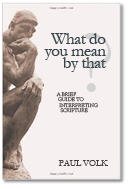I actually have a Scofield (the ’67 edition with word changes) and like it a lot. I favor its literal and futuristic approach to prophecy and Israel, but not its particular variety of dispensationalism, particularly its view of the nature of the church.
There are two basic pillars that support ‘pre-tribulational’ dispensationalism. One is the doctrine of imminence (the view that no prophetic event stands in the way of the potentiality of an any moment coming of Christ, a potential that has existed since the earliest apostles first preached the ‘blessed hope’, which they define as exemption from the great tribulation). The second pillar is dispensationalism’s unique view of the nature of the church. According to dispensationalism, the church had no existence before Pentecost and does not (cannot) exist on earth after the rapture. I see both of these pillars as seriously flawed.
According to dispensationalism, there are two distinct programs of God, two distinct peoples of God, and two distinct dispensations for Israel and the church. The church belongs to God’s ‘mystery’ program for this dispensation only. The dispensation of the ‘church’ is seen as confined to the period between Pentecost and the rapture. In their view, the concept of the mystery removes the church from anything anticipated in OT prophecy. Therefore, it is believed that the dispensation of the church must end with the rapture before the “prophetic program” for Israel can be resumed. Thus the events of the last seven years (Daniel’s seventieth week), are understood to belong to an entirely different dispensation.
It is believed that the church is a mystery that occupies a parenthetical interim between Pentecost and the rapture, and thus stands in marked contrast to God’s “prophetic program” for Israel. According to dispensationalism’s erroneous view of the Pauline mystery, the church is so completely distinguished from even the righteous of Israel as to constitute a distinct people of God with its own distinct destiny. This doctrine of the two peoples of God is THE defining hallmark of pre-trib dispensationalism.
Note: (These features of dispensational thought developed in the mid 19th century out of an effort to understand the distinction between Israel and the church. Early, pretribulationism was not initially born out of a desire to escape tribulation as unfairly accused. Rather, the primary motive was to defend the hope that Christ could come any moment, i.e., the doctrine of imminence.)
We too distinguish between Israel and the church, but not in this way. There is another choice that does not require the dispensationalist’s notion of two peoples of God.
(… More …)


 In the end, there is only one finally decisive question; it is, “What saith the Scripture?” To quote a dear friend, “What does the text SAYYYY?!” By the way, that friend, whom you may know, Paul Volk, has very recently written the best little booklet on this subject that I have personally ever seen. It is titled, “
In the end, there is only one finally decisive question; it is, “What saith the Scripture?” To quote a dear friend, “What does the text SAYYYY?!” By the way, that friend, whom you may know, Paul Volk, has very recently written the best little booklet on this subject that I have personally ever seen. It is titled, “



